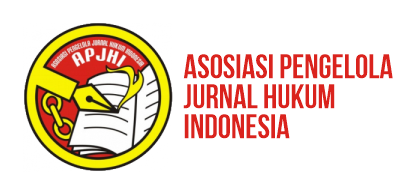The Restitution of Children as Victims of the Crime of Obscenity in the Principles of Restorative Justice
Abstract
Keywords
Full Text:
PDFReferences
Book:
Barda Nawawi Arief, Criminal Law Reform in the Perspective of Comparative Studies, Bandung: Citra Aditya Bakti, 2011
Eva A. Zulfa, Restorative Justice, Jakarta: FHUI, 2009
Rena Yulia, Victimology of Legal Protection Against Victims of Crime, Yogyakarta: Graha Ilmu, 2010
Satjipto Rahardjo, Let the Law Flow; Critical Notes on Human Struggle and Law, Jakarta: Kompas Book, 2007
Siswanto Sunarso H, Victimology in the Criminal Justice System, Jakarta: Sinar Graphic, 2014
Journal:
Dheny Wahyudhi. (2015). Protection of Children in Conflict with the Law through a Restorative Justice Approach. Jambi Journal of Law
Ibn Suka, et.al. 2018. The Role and Responsibilities of the Police as Law Enforcers in Implementing Restorative Justice for Justice and Community Benefits. Khairah Ummah Legal Journal, 13(1), 111-118.
Josephine Mareta. (2018). Application of Restorative Justice through the Fulfillment of Restitution for Victims of Child Crime. Indonesian Legislation Journal, 15(4), 309-319
Strong Praise Prayitno. (2012). Restorative Justice for Judiciary in Indonesia (Philosophical Juridical Perspective on Law Enforcement In Concreto)". Journal of Legal Dynamics, 12(3), 409-420
Mahrus Ali. (2007). Progressive Criminal Justice System: Alternatives in Criminal Law Enforcement. Journal of Law, 2(2), 210-229.
Vivi Ariyanti. (2019). Law Enforcement Policy in the Indonesian Criminal Justice System.
Juridical Journal. 6(2), 33-54.
DOI: https://doi.org/10.33756/eslaj.v2i3.14598
Refbacks
- There are currently no refbacks.
Copyright (c) 2020 Estudiente Law Journal
License URL: http://creativecommons.org/licenses/by-sa/4.0/
| | | |
| | | | |
| | | | |
| | |
Estudiante Law Journal has been available at:
| | | | |
| | | | |
| | | | |
| | | | |




-2.png)
.png)





